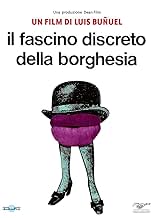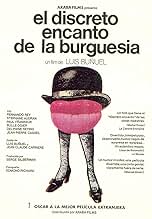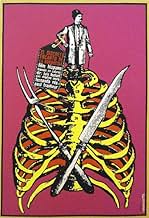Le charme discret de la bourgeoisie
- 1972
- Tous publics
- 1h 42min
NOTE IMDb
7,7/10
49 k
MA NOTE
Une série de rêves surréalistes, concentrés sur six personnes de la petite bourgeoisie et leurs tentatives constamment interrompues de prendre un repas ensemble.Une série de rêves surréalistes, concentrés sur six personnes de la petite bourgeoisie et leurs tentatives constamment interrompues de prendre un repas ensemble.Une série de rêves surréalistes, concentrés sur six personnes de la petite bourgeoisie et leurs tentatives constamment interrompues de prendre un repas ensemble.
- Réalisation
- Scénario
- Casting principal
- Récompensé par 1 Oscar
- 7 victoires et 9 nominations au total
Stéphane Audran
- Alice Sénéchal
- (as Stephane Audran)
Avis à la une
"The Discreet Charm of the Bourgeoisie", a leisurely paced, incisive satire on social mores and class hypocrisy, opens with a group of friends arriving on the wrong day of a dinner engagement. this is only the begining of a succession of unexpected and unusual events to follow. The dinner party is the movie's main setting and it is there that reality and illusion often times blend imperceptibly together. The film is structured as a series of surreal sequences, which prompted esteemed film critic Pauline Kael to opine 'His(Director Louis Bunuel) indifference to dramatic logic is complete.' And how. Bunuel's narrative plays an elaborate game with the viewer through it's subconscious imagery and audacious use of time. His tendency to experiment with technique and form often times led to discovery and innovation. The cinema of Louis Bunuel invariably deals with the discrepancy between appearance and reality; decorum and desire. His world view was subversive and anarchistic. He was a cheerful pessimist, skeptical but not susceptible to Bergmanian despair. His skepticism extended to all of those he found playing too neat a social game. The filmmaker's career was one sustained assault on authoritarianism. Witness an indiscreet character in the film who claims: 'No one system can help the masses acquire refinement.' He believed man was, unconsciously, a slave to custom and aimed to shock viewers out of their unthinking acceptance of established values. "The Discreet Charm of the Bourgeoisie"(An Academy Award winner in 1972 for Best Foreign Film) is a boldly inventive picture. Dozens of frames are filled with clever filmic devices: environmental noises increase inordinately during routine conversations; an ambiguous procession is inserted freely within the text. These cinematic ploys add intrigue to the already peculiar goings-on. The walk by the main group of characters along a country roadside is mysterious and compelling. The players are noticeably silent and contemplative. Is this an anxious dream? The afterlife? An insignificant flashback? Whichever, the recurring sequence underscores the obliqueness and cool obscurity of the film. One might not identify closely with the disenchanted Bunuelian sensibility or the unsentimental stance he takes, however one knows immediately and unmistakably that they are in the gifted hands of a film technician like a Godard or Kurosawa. A director in complete control of his medium. A highly personal filmmaker frequently referred as 'a poet of hallucination who follows the caprices of his fantastical imagination.' Someone whose fanciful paths of creation were invariably led by the irrational. "The Discreet Charm of the Bourgeoisie", with it's arresting mixture of calculation and carelessness, remains a unique and influential movie. The acerbic films of Robert Altman and the perverse mischievousness of the Coen brothers films, to mention but a few, pay a large debt to the strange universe and unconventional perspective of Louis Bunuel. Film lovers uninitiated in surrealist cinema will find "The Discreet Charm of the Bourgeoisie" an alluring and beguiling crash course.
Director Luis Bunuel is often described as a surrealist, but the word misapplied in reference to his later works, where the the term absurdism is much more appropriate. Such is the case with the Academy Award-winning THE DISCREET CHARM OF THE BOURGEOISIE, which begins with four friends who arrive at their hosts' home only to discover they have arrived on the wrong night--a plausible situation. But before the film has run its course, Bunuel unravels his tale of a meal that never quite happens in the most unexpected ways imaginable.
The film works on several levels, mocking social conventions, the church, and eventually spilling its action into a series of overlapping nightmares in which various attempts to dine are frustrated by everything from the corpse of a restaurant manager in a nearby room to military maneuvers. On one memorable occasion, the friends are invited to dine and are seated around an elegant table--when a curtain suddenly rises behind them and reveals them to be seated on a stage before a hostile audience! The cast (which features Fernando Rey, Delphine Seyrig, Paul Frankeur, Bulle Ogier, Stephane Audran and Jean-Pierre Cassel as the constantly frustrated diners) plays with considerable aplomb, performing the most irrational scenes with a magnificent realism. When combined with Bunuel's absurdist story, the result is a disquieting yet often very funny discourse on frustrated appetites both real and imagined, and with many layers of incidental meaning along the way.
A word of caution to the uninitiated: Bunuel is not for those who seek a tidy plot line with clear-cut meanings. But if you come to it with an open mind, you'll find plenty of food for thought!
Gary F. Taylor, aka GFT, Amazon Reviewer
The film works on several levels, mocking social conventions, the church, and eventually spilling its action into a series of overlapping nightmares in which various attempts to dine are frustrated by everything from the corpse of a restaurant manager in a nearby room to military maneuvers. On one memorable occasion, the friends are invited to dine and are seated around an elegant table--when a curtain suddenly rises behind them and reveals them to be seated on a stage before a hostile audience! The cast (which features Fernando Rey, Delphine Seyrig, Paul Frankeur, Bulle Ogier, Stephane Audran and Jean-Pierre Cassel as the constantly frustrated diners) plays with considerable aplomb, performing the most irrational scenes with a magnificent realism. When combined with Bunuel's absurdist story, the result is a disquieting yet often very funny discourse on frustrated appetites both real and imagined, and with many layers of incidental meaning along the way.
A word of caution to the uninitiated: Bunuel is not for those who seek a tidy plot line with clear-cut meanings. But if you come to it with an open mind, you'll find plenty of food for thought!
Gary F. Taylor, aka GFT, Amazon Reviewer
The systematic analysis of this film would be in my opinion a gigantic task, since there are so many topics, stories and references intermingled in the chaotic way the surrealists are so fond of. I think the two main topics -sometimes in surrealism there is not even one- are dreams and transgression of social norms and traditions. The film is articulated on linked-up situations: five gatherings of a group of bourgeois friends and four stories, four dreams which are dreamt by different characters. The suppers are more common in the first part of the film, and the dreams on a second part, but they alternate with each other and with other episodes, like that of the terrorist girl. At the beginning things seem not to turn out good: right the first thing we see is the perplexity of the guests to M. Senechal house when they are told the supper was planned for the next day. 'But that is impossible', says Acosta, 'I couldn't have accepted, tomorrow I'm busy'. Contradiction with no explanation, right the same way as things happens in a dream, where we accept the reality of what we dream without explanations, even if it is impossible or contradictory with something else -dreams are the core of surrealism and of this film. This baffling beginning really impressed me. There is contradiction and kind of a difficulty to do things in every single detail in the next sequence: Mme and M Senechal are invited to dine out, but she has to change. The restaurant 'n'a pas l'air gai', and the door is locked. They knock and they are invited in. The owners have changed. There is no people and the prices are cheap. Everything is suspicious. And then the first punch of the story: the manager died that afternoon and the wake has been set in the dining room since the undertaker has not yet arrived. Of course, the bourgeois leave. This is the first reference to death, a constant theme either in surrealism, in dreams and in this film. It seems as if the whole film was a dream. Within the context things are logical and normal -or seem logical and normal- to the characters, and their reactions are 'contextually' logical too, but from the outside the stories in the film are as odd as any dream we can have. E.g., when Acosta shoots the terrorist girl from his window, or when the army appeared at M. Senechal's house, or even when the bishop tells M Senechal that he wants to be the family gardener. They are baffled, but they accept the things that happen, as we are baffled by or dreams but accept their logic when we are dreaming. Social transgression is based on a subtle but scorning parody of the bourgeois class and their customs and beliefs. The bourgeois are classy, and conceited: they show off their vain culinary knowledge every time they host a supper. M. Thevenot boasts that 'discreet charm' of the bourgeois when he subtly makes fun of the chauffeur: he does not know how to drink a Martini. Later on, Acosta cheats on Thevenot when he tells him that he has to show his wife the 'sursiks'. Thevenot does not know what that is, but he is an hypocrite not to say it. The bourgeois are also extremely fond of the lowest vices and they enjoy them gaily -I do not think, on the other side, that Buñuel is condemning them, but the hypocritical attitude of the bourgeoisie. Drug trafficking and consumption, lust, alcohol. The commentaries about the younger girl vomiting and dirty nails and her ignorance (the complex of Euclides, she says at some point) point out -and laugh at- the hypocrisy in the values of the middle-high classes. Also the Church and the Army are criticized. The Bishop, a main head of the Church, is humble -a extremely acid irony- but will mercilessly kill a poor man that will die anyway -that adds to the cruelty. The Bishop is also ignorant: he does not know where the Republic of Miranda is. The soldiers and officers smoke marihuana and praise it, they even are connoisseurs! -'Mexico or Congo?', the general asks, referring to the origins of the product.. The dreams come over mainly in the second part of the film. Both the two first of them are dreamt by soldiers. I really enjoyed them. In the first one I see a little bit of a reference of the life in Spain on the times when Buñuel was a kid -I do not know Buñuel's early life in Spain, but I presume there could be some autobiography. The looks of the parents of the young soldier, their clothes and the strict, militarist attitude of the father made me think of the Spanish family life in the turn of the century XIX to XX. I also liked the second dream. The dark and blurry street and house and the background noise make a great dreamy scene. In this dream, the soldier meets a dead friend. Then another friend comes over, and makes him realize that it is impossible. Sometimes in real dreams this happens too. Something happens and then, with no explanation, we realize that is impossible. It also should be pointed out that these two dreams share two primal human topics: motherly feelings and fear to death. The topic of death is present in some other dreams: the general's, in which Acosta shoots him dead; or the dream about the ghost of the sergeant. Another primal fear is dealt with in Senechal's dream: shame. They are caught in a theater stage while they are having dinner -this is a recurrent dream that sometimes takes other forms: being naked in the middle of the street or lying on your bed wearing you pajamas in your classroom. I also found humor all over the film: funny situations such as the bishop offering himself as a gardener, or the straws in M. and Mme. Senechal hair. Acosta playing tricks on Thevenot, or the soldiers happily smoking joints and listening to a 'sympa' dream. But I do not know if Buñuel is trying to be funny or only to transgress. And that transgression is hilarious because it reveals the hypocrisy of society.
Bunuel is arguably the greatest of all filmmakers. With the possible exceptions of Hitchcock and Fassbinder, I can think of no other director who so completely understood the potential of the medium to transcend the traditional conventions of narrative, or exploited this potential with such élan. And he doesn't rely on special effects: we enter the surreal realm so seamlessly that it at times seems banal. This is especially the case in 'Le charme': banal people have banal sub-consciousnesses.
In order to begin to appreciate Bunuel I had to immerse myself in his milieu, so foreign was his sensibility to the usual expectations I had brought with me into a movie theater.
It took me several viewings to get the 'jokes' if 'Le charme'. The Ambassador from some obscure Latin American country ('Miranda', or 'wonder', a nod to Shakespeare), supports this little microcosm of comfortable Parisian bourgeois respectability with cocaine smuggled in diplomatic pouches. Guests arrive for a dinner party on the wrong evening, and interrupt the hosts having sex. A wake is being held in the back room of the restaurant they are planning to dine at. Ice cubes for martinis must be 'exactly zero degrees'. Elegant ladies sit down for a fashionable afternoon tea, only to be told by their waiter that the restaurant has run out of water (?!!). A soldier then comes to their table and relates his parricidal dream, while the polite ladies listen to him unfazed. One of the ladies discreetly slips away for an assignation with another one's husband. Only Bunuel!
Doubtless the inspiration for this film comes from the Latin Bunuel's lifetime of experience observing the French in situ. Much of its fun comes from simply watching the French be so . . . French. And there is no bourgeois like a French bourgeois!
Much of 'Le Charme' takes place in the nightmares of its characters: you are sitting down for a dinner being hosted by a general, only to realize that you are on stage (with a prompter giving a cue from Don Juan: 'Invite the commander's ghost for dinner!'); your elegant dinner party is broken up by a gang of thugs looking to kill you. However, you are so wedded to the ceremony of the dinner party that you get caught stealing a piece of meat from the table under which you are hiding (and end up dying like a dog!)
I could see this movie a hundred times and always find something new. I would never be bored by it.
Bunuel is very funny, but he is also dense and difficult. One doesn't realize the true complexity of his films because they all seem so effortless. Nothing great comes easily. He's like great Bordeaux: you can't quaff it -- it demands to be sipped.
Bunuel is famous for having the lowest shoot to take ratio of any filmmaker, less than 2:1. Second takes were rare (compare with the reams that end up on the cutting room floor for the typical Spielberg film.) He knew exactly what he wanted to see before he shot. Hitchcock, a director who resembles Bunuel in many ways, famously referred to actors as 'cattle'. For Bunuel, they were probably more like toy soldiers. This isn't to say that he didn't get brilliant performances out of them, especially from his screen alter-ego, the wonderful Fernando Rey.
Henry Miller dubbed his good friend Luis Bunuel "The Last Heretic". I can't think of a higher compliment. Bunuel's memoirs, 'My Last Sigh', are a must read for anyone who wants to have an appreciation of Paris in the 20s, the of art in the last century, and martinis, made as they should be, with gin.
In order to begin to appreciate Bunuel I had to immerse myself in his milieu, so foreign was his sensibility to the usual expectations I had brought with me into a movie theater.
It took me several viewings to get the 'jokes' if 'Le charme'. The Ambassador from some obscure Latin American country ('Miranda', or 'wonder', a nod to Shakespeare), supports this little microcosm of comfortable Parisian bourgeois respectability with cocaine smuggled in diplomatic pouches. Guests arrive for a dinner party on the wrong evening, and interrupt the hosts having sex. A wake is being held in the back room of the restaurant they are planning to dine at. Ice cubes for martinis must be 'exactly zero degrees'. Elegant ladies sit down for a fashionable afternoon tea, only to be told by their waiter that the restaurant has run out of water (?!!). A soldier then comes to their table and relates his parricidal dream, while the polite ladies listen to him unfazed. One of the ladies discreetly slips away for an assignation with another one's husband. Only Bunuel!
Doubtless the inspiration for this film comes from the Latin Bunuel's lifetime of experience observing the French in situ. Much of its fun comes from simply watching the French be so . . . French. And there is no bourgeois like a French bourgeois!
Much of 'Le Charme' takes place in the nightmares of its characters: you are sitting down for a dinner being hosted by a general, only to realize that you are on stage (with a prompter giving a cue from Don Juan: 'Invite the commander's ghost for dinner!'); your elegant dinner party is broken up by a gang of thugs looking to kill you. However, you are so wedded to the ceremony of the dinner party that you get caught stealing a piece of meat from the table under which you are hiding (and end up dying like a dog!)
I could see this movie a hundred times and always find something new. I would never be bored by it.
Bunuel is very funny, but he is also dense and difficult. One doesn't realize the true complexity of his films because they all seem so effortless. Nothing great comes easily. He's like great Bordeaux: you can't quaff it -- it demands to be sipped.
Bunuel is famous for having the lowest shoot to take ratio of any filmmaker, less than 2:1. Second takes were rare (compare with the reams that end up on the cutting room floor for the typical Spielberg film.) He knew exactly what he wanted to see before he shot. Hitchcock, a director who resembles Bunuel in many ways, famously referred to actors as 'cattle'. For Bunuel, they were probably more like toy soldiers. This isn't to say that he didn't get brilliant performances out of them, especially from his screen alter-ego, the wonderful Fernando Rey.
Henry Miller dubbed his good friend Luis Bunuel "The Last Heretic". I can't think of a higher compliment. Bunuel's memoirs, 'My Last Sigh', are a must read for anyone who wants to have an appreciation of Paris in the 20s, the of art in the last century, and martinis, made as they should be, with gin.
There are not many artists who could tell the same joke over and over again and get away with it creating the film as brilliant, funny, absurd, witty, and clever as Buñuel's "The Discreet Charm of the Bourgeoisie", 1972. The story of six friends who try to arrange and have a nice dinner together but cannot complete (or even start) their meal does not sound very exiting but wait until you watch this comedy. I've always known how interesting surrealism is but I never thought how funny it could be. I've seen the film four or five times - it only gets better with each viewing. Highly recommended.
9.5/10.
9.5/10.
Le saviez-vous
- AnecdotesThe movie includes three of Luis Buñuel's recurring dreams: a dream of being on stage and forgetting his lines, a dream of meeting his dead cousin in the street and following him into a house full of cobwebs, and a dream of waking up to see his dead parents staring at him.
- GaffesAfter Rafael gives the terrorist champagne, his position in the chair changes between shots.
- Citations
Rafael Acosta: You're much better suited for making love than for making war. Vamos, muchacha. Vamos.
- ConnexionsFeatured in Pour le cinéma: Épisode datant du 16 septembre 1972 (1972)
Meilleurs choix
Connectez-vous pour évaluer et suivre la liste de favoris afin de recevoir des recommandations personnalisées
- How long is The Discreet Charm of the Bourgeoisie?Alimenté par Alexa
Détails
- Date de sortie
- Pays d’origine
- Site officiel
- Langues
- Aussi connu sous le nom de
- El discreto encanto de la burguesía
- Lieux de tournage
- Société de production
- Voir plus de crédits d'entreprise sur IMDbPro
Box-office
- Budget
- 800 000 $US (estimé)
- Montant brut aux États-Unis et au Canada
- 82 471 $US
- Week-end de sortie aux États-Unis et au Canada
- 6 075 $US
- 26 juin 2022
- Montant brut mondial
- 103 230 $US
Contribuer à cette page
Suggérer une modification ou ajouter du contenu manquant

Lacune principale
By what name was Le charme discret de la bourgeoisie (1972) officially released in India in English?
Répondre



































